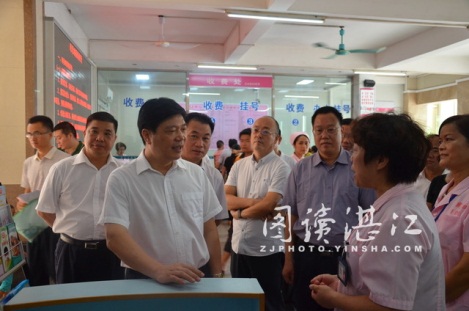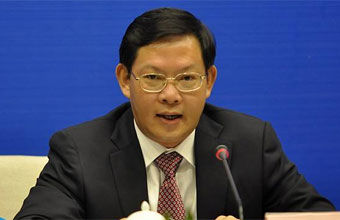Home> Innovation
Zhanjiang's healthcare reform to be rolled-out across Guangdong
Zhanjiang's pioneering healthcare reform has got the nod from the provincial government and will be applied to other cities in Guangdong. Fu Bin, deputy of Guangdong provincial people's congress and head of Xuwen People's Hospital, told Zhanjiang Daily on Jan 22.
The newly-released Guangdong government work report requires a province-wide establishment of medical institutions, and integrated management services in villages and towns, which Zhanjiang has been striving to do with large finance input since 2014.
With Xuwen county and Suixi county taking the lead to carry out the reform which includes building standardized facilities and sharing human resources, by 2016 the reform had covered all medical institutions across Zhanjiang's villages and towns.
 |
Zhanjiang Party Secretary Wei Hongguang inspects Xiashan Maternal and Children Health Hospital, where reform was rolled-out in 2014. [Photo by zjphoto.yinsha.com] |
Fourteen state-owned county hospitals supervise and give guidance to 87 health centers at lower levels on facilities improvement and talent management.
The two-way referral system promoted by the national government has proven effective in Zhanjiang. The system advocates the medical referral of patients with serious illness from low level health institutions to high-levels, except for emergency cases; likewise, patients with minor illness are referred back to lower-level hospitals.
During the first five months in 2016, 17,205 patients diagnosed at heath centers in towns and villages were transferred to upper-level medical organizations, an increase of 34.6 percent over the same period of last year.
Some 800 senior doctors at high-level hospitals provided treatment to patients in towns and villages, and were granted bonuses based on the days they worked.
"Since the reform was carried out, the comprehensive treatment capacity of grassroots medical institutions has significantly improved, which greatly benefits patients," said Fu.

 Print
Print Mail
Mail 5G construction supports Zhanjiang's high-quality development
5G construction supports Zhanjiang's high-quality development
 Acting mayor inspects project construction in Xuwen, Leizhou
Acting mayor inspects project construction in Xuwen, Leizhou Zhanjiang island an "egret paradise"
Zhanjiang island an "egret paradise"  Dancing egrets add vitality to Xiashan
Dancing egrets add vitality to Xiashan